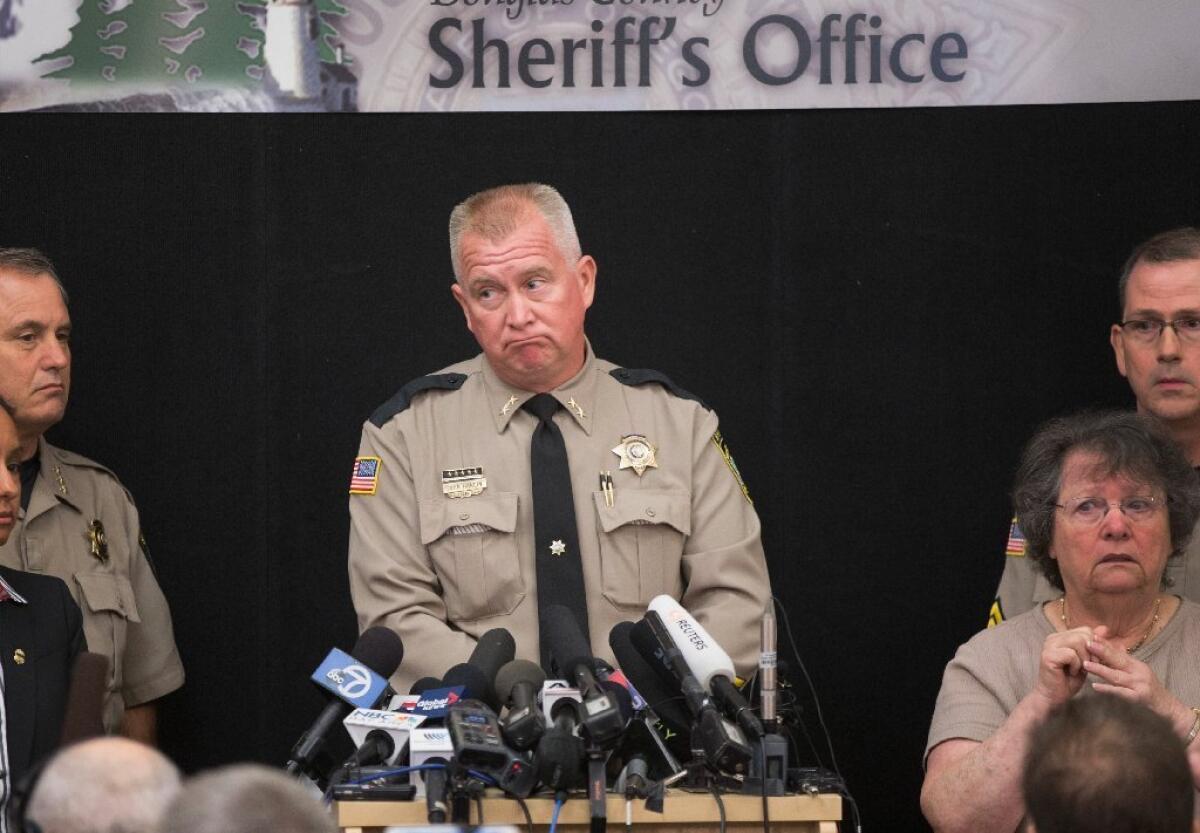For mass shooters, achieving fame -- or infamy -- is a frequent driver

Douglas County Sheriff Jeff Hanlin says he doesn’t want to “glorify” the actions of mass shooter Chris Harper-Mercer by speaking his name. He may be onto something: Those who study mass shootings and those who commit them say fame is often an important motive.
- Share via
At the epicenter of the nation’s latest mass shooting in Oregon, Douglas County Sheriff John Hanlin says the motives of the man who fatally shot 9 people on a college campus Thursday are not known.
But Hanlin, who says he will not “glorify” the perpetrator’s name by uttering it on national television, has suggested one factor driving the murderous actions of 26-year-old Chris Harper-Mercer: a quest for fame.
Hanlin’s suspicion is shared by many who probe the minds of mass shooters. In a society saturated by firearms and preoccupied by celebrity, these experts say that those who perpetrate such armed mayhem often seek to break the bonds of their invisibility and achieve what they feel life has denied them:
Recognition. Glory. Respect.
On Friday, evidence mounted that Harper-Mercer was acutely attuned to the fame that comes to those who commit armed murder on a spectacular scale. Combing through the gunman’s online comments for clues to his motives, investigators found Harper-Mercer recently extolled the benefits of armed mayhem.
“I have noticed that so many people like him are all alone and unknown, yet when they spill a little blood, the whole world knows who they are,” Harper-Mercer wrote in a post about Vester Flanagan, who in August shot two news reporters on live television in Roanoke, Va.
“A man who was known by no one, is now known by everyone. His face splashed across every screen, his name across the lips of every person on the planet, all in the course of one day. Seems the more people you kill, the more you’re in the limelight,” Mercer wrote.
University of Alabama criminologist Adam Lankford said that fame -- or infamy -- has emerged as a common thread in mass shootings since Eric Harris and Dylan Klebold predicted on videotapes left behind that their armed rampage at Columbine High School would be one for the history books.
As they planned the shootings that would claim the lives of 12 fellow students and one teacher, Harris and Klebold “predicted with chilling and stunning accuracy was how their actions and offenses would encourage other similarly disaffected individuals to follow suit,” said Dr. Steven Pitt, who conducted a psychiatric autopsy of the incident for Colorado law enforcement officials.
“And sadly, they were correct,” he said. A long litany of mass shooters -- from Virginia Tech gunman Cho Seung-Hui to Adam Lanza of Newtown, Conn. -- have cited Harris and Klebold as inspirations for their actions.
The bid for public attention and renown is not unique to American gunmen, said Lankford, who is conducting a comprehensive study of the mass-shooting phenomenon. But it is a common thread that lies uniquely at the intersection of two American obsessions: guns and celebrity.
And so, he said, it is a regular feature of mass shootings in the United States, especially of those committed by younger perpetrators and gunmen whose actions have higher death tolls.
“Are they all fame seekers? To say that would be a little too simplified,” Lankford said. “But a large percentage of them are trying to speak to an audience” far larger than their families and acquaintances.
Many mass shooters, Lankford said, leave behind writings and videotaped manifestos that they clearly intend to be found, played and replayed in the echo chamber of American media. They inveigh against their tormentors and seek to justify their actions.
And at some point, most echo the message left behind by Elliot Rodger, who killed six people in a rampage last year near UC Santa Barbara: that the fame they expect to achieve - -no matter how dubious or ephemeral -- will avenge the rejection or isolation that drove them to action in the first place.
------------
FOR THE RECORD
Oct. 2, 6:35 p.m.: An earlier version of this article erred in describing Elliot Rodger as “UC Santa Barbara mass shooter”; he was not a student at the university, and he committed his crimes in nearby Isla Vista, not on the campus. In addition, he fatally shot three people and fatally stabbed three others; he did not fatally shoot eight.
------------
“Infamy,” Rodger wrote in a 137-page autobiography, “is better than total obscurity.”
That view -- related to the adage that “no publicity is bad publicity” -- has long been part of the American cultural landscape, Lankford said. But its power over young Americans appears to have escalated: In 2007, a Pew Research poll of Americans aged 18 to 25 found that 51% agreed that “to be famous” was one their generation’s most important goals in life.
Mass shooters often openly admire the handiwork of those who have killed before them. They compare their forerunners’ methods, the tolls of their shooting sprees and the coverage they got. Some, such as James E. Holmes, who fatally shot 12 in a movie theater in Aurora, Colo., leave behind evidence that, in planning their own actions, they were at pains to top earlier shootings in scale or in style.
“Just look at how many fans you can find for all different types of mass murderers,” Lanza wrote in on online post before fatally shooting 20 children and six staff members at Sandy Hook Elementary School.
Lanza’s online activity, discovered after the 2012 attack, suggested he was “obsessed” with mass shootings and those who perpetrated them, and viewed the field as competitors, Lankford said. After Anders Behring Breivik murdered 77 in a pair of 2011 attacks in Norway, Lanza wrote in an online post that someone had “finally” topped Woo Bum-kon, who in a 1982 attack killed 56 people in South Korea.
Lanza went on the declare that when a mass shooter’s motives are a “mystery,” the case gets more attention. Lanza destroyed his computer before his attack, leaving investigators to comb the Internet to find his writings.
“There’s this hall of fame of mass murderers,” said Pitt, a forensic psychiatrist in Scottsdale, Ariz. Prospective entrants admire what others did, and plan their own revenge as a submission for entry.
“These guys are mostly nobodies who, by virtue of committing terrible and heinous acts, become somebodies for a short time,” Pitt said. “It’s a very exclusive and very dark club.”
Dr. Jeff Victoroff, a forensic psychiatrist at the University of Southern California, sees the roots of such behavior in evolutionary terms: Since banding together in groups, humans and other primates have sought to show their dominance in a bid to survive and reproduce, and whether one achieved status by good works or brutality did not always matter.
In the United States, as trust in government has eroded and the availability of guns has surged, that primitive status-seeking has increasingly manifested itself as “social rage,” Victoroff said. Extremists, political blusterers, fear-mongers and rabble-rousers all have been uniquely prized in American culture. However despicable and extreme his actions, the armed-and-angry mass shooter is expressing his “social rage” in a way that earns him national fascination.
In the end, Victoroff said, it’s the availability of so many guns -- about 270 million firearms in U.S. households -- that turns a quirk of nature into a fatal weakness.
“It’s us,” Victoroff said. So long as steps to reduce gun violence are paralyzed by politics, he added, angry young men will seek fame--or infamy--and the mass shootings will continue.
Follow me on Twitter @LATMelissaHealy and “like” Los Angeles Times Science & Health on Facebook.







